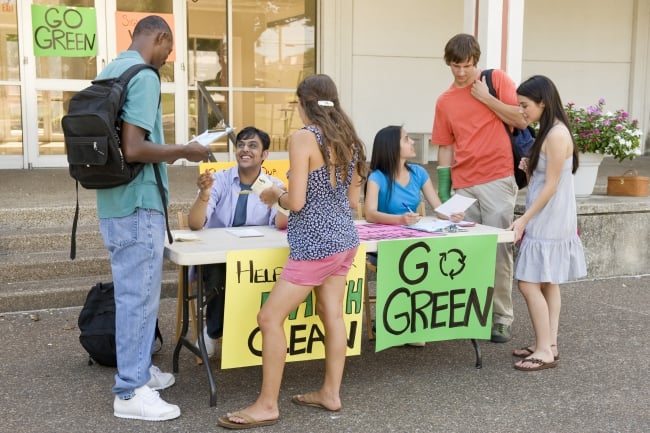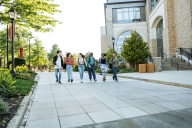You have /5 articles left.
Sign up for a free account or log in.

Student involvement in climate solutions can help mitigate eco-anxiety.
Yellow Dog Productions/Photodisc/Getty Images
A winter 2022 Student Voice survey by Inside Higher Ed and College Pulse found 81 percent of college students were at least somewhat worried about climate change, and 85 percent said it was at least somewhat important for their campus to prioritize sustainability. A September report from Sacred Heart University found more than half of U.S. youth report experiencing eco-anxiety, and 74 percent agree or somewhat agree with the statement “I am personally worried about climate change.”
Addressing student anxieties can be difficult for colleges and universities, but a majority of young people believe institutions should teach about sustainability and social justice, according to the Sacred Heart study.
Inside Higher Ed compiled some university-sponsored initiatives that promote education, action and engagement related to climate change.
In the curriculum: In response to student interests in sustainability and climate science, many colleges and universities have created programs of study, both majors and minors, that focus on these areas.
Arizona State University and the University of California, San Diego, require all undergraduate students to complete a course focused on sustainable development and climate change, respectively. At both institutions, students can choose from a range of courses that fulfill the requirement across the university’s academic departments, which allows students to tailor their learning to their interests.
Professors are also leading the charge in teaching about climate issues. A two-semester experiential learning course at the University of Connecticut, led by faculty involved with the Peter J. Werth Institute for Entrepreneurship and Innovation, provides students the opportunity to develop their knowledge in sustainability and climate change in the first course, then execute ideas in the second course.
Students learn about human, economic, environmental and social pillars of sustainability through courses that culminates in them presenting proposals for ideas related to sustainability and climate change. Their second term, students participate in a research project, complete an internship with a climate-oriented start-up or develop and launch their own venture.
One group of students created an eco-anxiety club, UConn Climate & Mind Network, which helps students through the climate crisis by creating an outlet to talk about their feelings.
In spring 2024, a group of professors at eight University of California campuses introduced a new online course focused on climate resilience that includes mini-lectures from world leaders and in-person mindfulness training at each UC campus.
Led by students: Another way institutions are encouraging student advocacy and action in climate spaces is through funding sustainable initiatives and ventures.
The University of Washington’s Foster School of Business hosts an Environmental Innovation Challenge, funding undergraduate and graduate student projects that address problems related to climate and the environment. Students from colleges and universities across the region (including Washington, Oregon, Idaho, British Columbia and Alaska) are eligible to participate each fall, with a $15,000 grand prize on the table.
Similarly, Harvard University’s Institute for Climate and Sustainability awards funding for student organization–led projects that focus on climate initiatives, each contributing to research and education in the climate sphere.
At Calvin University in Michigan, a group of students in the fall 2023 Engineering 333 class was asked by then-president Wiebe Boer to establish when the university should aim to be carbon neutral. Four teams of students each tackled different needs of carbon neutrality—electricity, heating, efficiency and funding—to provide the university with recommendations on how to reduce carbon emissions. Suggestions included installing geothermal ground-source heat pumps and smart thermostats, adding a solar farm to campus, and buying carbon offsets.
Each team lead presented their findings at a public seminar that fall and suggested the university shift its neutrality date to 2030. Now, the program has evolved to involve students across disciplines to design a plan for a solar energy farm.
Student organizations and clubs can facilitate peer leadership and engagement in sustainability. Learners at the University of Pennsylvania recently established a chapter of Citizens’ Climate Lobby, a grassroots organization working to address climate change through policy.
How does your college or university encourage students to learn about and enact change in the climate? Tell us more.








